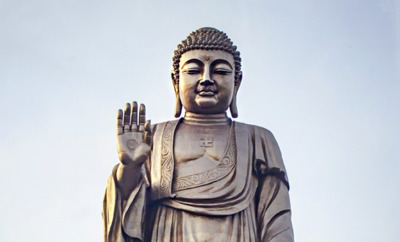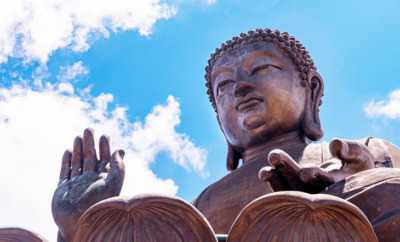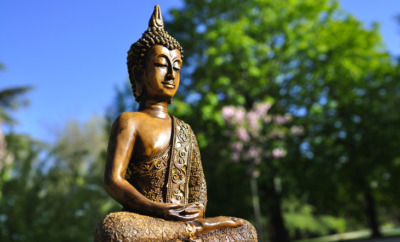5 Inspiring Life Lessons from Pema Chödrön’s “When Things Fall Apart”

5LifeLessons PemaChadron Feature
If your soul has been in need of calming, comforting and grounding wisdom, When Things Fall Apart should be at the top of your reading list.
Pema Chödrön’s When Things Fall Apart: Heart Advice for Difficult Times draws on traditional Buddhist wisdom for overcoming life’s obstacles.
This classic and beloved book in the personal development genre doles out so much wisdom on every page, you’ll swear it was written especially for our present times!
Who is Pema Chödrön and What Is This Book All About?
Pema Chödrön is an American Tibetan Buddhist and ordained nun. She’s authored many books and is considered a Buddhist thought leader.
Interested in learning more about Buddhism? Read: An Introduction to Buddhism
When Things Fall Apart is made up of short, digestible-yet-wisdom-packed chapters with titles like “Relax As It Is,” “Intimacy with Fear,” “Going Against the Grain,” and even “Hopelessness and Death” (more on these later).
Each chapter digs into a specific topic, but the unifying thread is Chödrön’s teaching to lean into discomfort and struggles in order to find true awakening.
This is a book that is totally worth buying a physical copy of – you’re going to want to bookmark, highlight, underline it, and turn to its wisdom time and time again.
When Things Fall Apart is full of mind-blowing takeaways – far too many to list. But this article will list five of the many key takeaways. Read on to learn more!
Here Are 5 Key Takeaways from When Things Fall Apart:
1. Running From Fear Robs Us of the Present Moment
In any unpleasant moment – whether it’s a job loss, a death, sickness, heartbreak, or smaller daily ickiness, our go-to response is to run away or “fix it.”
That advice, says Pema Chödrön in Chapter 1, is not what we need any more of – it’s our natural inclination already. Don’t beat yourself up for doing this, she says, but know that by turning away, we “cheat ourselves of the present moment.”
By giving up the frantic hunt for solutions and answers, we can find the peace we look for by settling into the current moment.
As counterintuitive as it may sound, Pema Chödrön says, “Next time you encounter fear, consider yourself lucky.” What does she mean by this? It’s when we’re cornered by fear and don’t bail out that we are on the path of true awakening.
2. The Goal is NOT to Find Constant Pleasure and Security
Building off the first point, Chödrön explains that the faulty notion that we’ll ever “arrive at a place that’s really swell” is what actually keeps us all miserable.
She’s not saying to simply accept misery or bad times – not exactly – rather, that “suffering is inevitable for humans as long as they believe that things last.” When the rug gets figuratively pulled out from under us, we can learn to “stay with that shakiness.”
That, she says, is the path to true enlightenment – not trying to always smooth things over and keep the peace, but learn to “relax in the midst of chaos.”
Read: Okay Buddha, Let’s Talk About the Third Noble Truth and What Brings an End to Our Suffering
3. Loving Kindness Toward Ourselves Builds the Strongest Foundation
“The most difficult times for many of us are the ones we give ourselves. Yet it’s never too late or too early to practice loving kindness,” says Pema Chödrön in Chapter 5.
In a world full of darkness and pain, learning to cultivate loving kindness toward oneself is as good a place as any to “start illuminating the darkness of difficult times.”
Start now! Practice This Guided Metta (Loving-Kindness) Meditation
After all, without loving kindness toward ourselves, it’s like we’re living life blind and deaf to all of the beauty around us.
This isn’t about “patting ourselves on the back” or doling out toxic positivity by telling ourselves everything’s going to be perfect. According to Pema Chödrön, it’s about seeing ourselves for who we really are, and cultivating unconditional friendship with ourselves.
4. Death and Hopelessness Are Not To Be Avoided
In perhaps her hardest-to-swallow but most crucial chapter in When Things Fall Apart, Pema Chödrön suggests that fear of change and death is at the root of all our misery.
It’s an inconvenient truth, but everything is always changing and ending. Trying to escape this truth is what causes anxiety.
So, what to focus on instead? A total appreciation of impermanence and change.
By trying to avoid suffering, we suffer more!
If you’re balking at this concept, Chödrön acknowledges it isn’t comfy! If the idea of becoming one with hopelessness feels icky, ickier still, she says, is a life lived on the false belief that there is something to grab onto.
To put it bluntly, she says we are addicted to hope. By trying to avoid suffering, we suffer more!
“Rather than letting our negativity get the better of us, we could acknowledge that right now we feel like a piece of shit, and not be squeamish about taking a good look. That’s the compassionate thing to do.”
5. Tonglen and Nonaggression Benefit the Entire World
Chödrön also offers some tangible advice we can all do to help ease the suffering worldwide.
Using poison as fuel, as she discusses in chapter 19, is at the core of tonglen, a practice taught by many meditation experts. When practicing tonglen, we each breathe in the suffering of the world around us and then when exhaling, we send peace, love, and security to all.
This is a great tactic to work into your daily meditation or anytime throughout your day.
Another tactic Pema Chödrön encourages is nonaggression, even and especially when someone has opinions totally different than our own. This is not about “ignoring or keeping quiet” but focusing on adding peace, not more aggression to the world – which never changes or helps anyone.
When Things Fall Apart By Pema Chödrön: The Big Takeaway
This is a book that will hit differently depending on where you’re at in life when you’re reading it. So read it, and then read it again.
No matter where you’re at or what you’re going through though, it’s impossible to read When Things Fall Apart and not feel some sense of relief and comfort.
Pema Chödrön’s overarching message is that by giving up the frantic hunt for solutions and answers – the very thing that causes us the most stress – we can find the peace we look for by settling into the current moment.
As Pema Chödrön says in the final pages of When Things Fall Apart, there is no final destination to arrive at. Our consciousness unfolds moment by moment, and it is not about predicting the future, but using this moment to become kinder, wiser, stronger, and more awake.
This very instant is the only place we need to be. We never know what will happen next, and in any moment we can make ourselves miserable or make ourselves strong. The choice is ours.
Looking for another inspiring book to dig into? Read: 4 Key Takeaways From Gabrielle Bernstein’s “Super Attractor”


This Month's Letter
From the Editor
Monthly motivation and food for
thought from our founder.





























